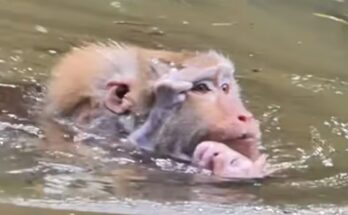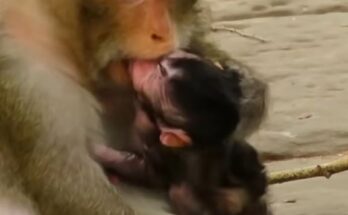Becoming a mother for the first time is a life-changing experience, not just for humans but across the animal kingdom. In the wild, a first-time mother monkey faces numerous challenges as she learns to care for her newborn, often without prior experience or guidance. Unlike older, more seasoned mothers who have developed skills over time, inexperienced mothers must rely on instinct, observation, and trial-and-error to navigate the delicate balance of nurturing, protecting, and teaching their young.
One of the primary challenges for a first-time monkey mother is understanding how to handle her newborn physically. Newborn monkeys are fragile and dependent, needing constant warmth, support, and nourishment. For some young mothers, this can initially be overwhelming. Without previous knowledge of how to carry, hold, or nurse properly, they may fumble awkwardly, sometimes holding their infants too tightly or too loosely. These early mistakes can pose risks to the baby’s safety and well-being, though they are a natural part of the learning process.
Feeding, in particular, can be a struggle. Nursing requires the mother to position the infant correctly and ensure that the baby latches onto her nipple. Some inexperienced mothers may not recognize the infant’s cues for hunger or may have difficulty staying still long enough for the baby to feed adequately. This can lead to the newborn becoming weak or dehydrated, which in turn adds stress to the mother as she tries to adapt to her new role.
Social dynamics within the troop also play a crucial role in how well a first-time mother adjusts. In many monkey species, experienced females, often called “aunties,” may step in to provide guidance or support. However, in some cases, other troop members may not be as welcoming. A young mother may face competition, aggression, or even attempts by other monkeys to snatch or harm her infant. She must learn to navigate these social tensions while keeping her baby safe, which can be particularly daunting without the confidence or status that older females possess.
Additionally, environmental pressures add to her challenges. Predators, food scarcity, and harsh weather conditions are ever-present threats. A new mother must quickly adapt to these challenges, all while ensuring her infant’s survival. Balancing the need to forage for food with the constant need to stay close and vigilant over her baby demands quick learning and heightened alertness.
Interestingly, studies of primate behavior have shown that over time, first-time monkey mothers gradually gain confidence and competence. They watch other mothers in the troop, mimic behaviors, and learn from their own missteps. Their bond with their infant strengthens as they become more attuned to the baby’s needs and signals.
The journey of a first-time monkey mother is a testament to resilience, adaptability, and the powerful instinct to nurture. Though she may face stumbles along the way, through perseverance and learning, she becomes not only a provider and protector but also a crucial link in the continuation of her species. Her experience reflects the universal challenges of motherhood, underscoring how growth often comes through patience, practice, and the support of the community.


